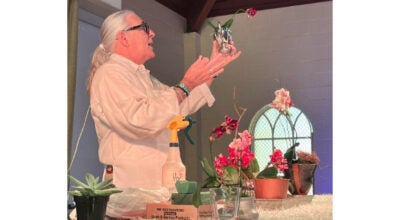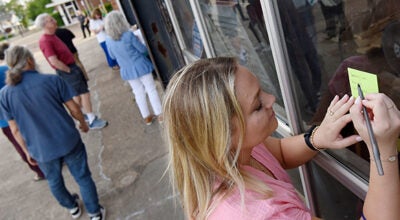Businesses respond to new law: ‘We’re selling’
Published 12:05 am Sunday, April 10, 2016
D’Evereux Foods owner Ashleigh Aldridge holds up a sticker she plans to put in her shop window advertising that she won’t turn away anyone’s buisness in light of a new law that would allow business owners to cite a strongly held religious convictions when declining to provide services that could be used in same-sex weddings. (Nicole Hester/The Natchez Democrat
NATCHEZ — At a time when some nationally are calling for boycotts of Mississippi for the passage of a controversial law that would allow business owners to turn down services to same-sex couples if they can cite a deeply held religious conviction, some Natchez businesses are raising a cry that they don’t support the measure.
Shortly after Gov. Phil Bryant signed House Bill 1523, D’Evereux Foods owner Ashleigh Aldridge, posted on her business’s Facebook page that those who want to visit Natchez should rest assured that they “WILL be welcomed with open arms and amazing food!”
Accompanying her post was an image of a blue circle with a rainbow in the middle bearing the text, “We don’t discriminate” and “If you’re buying, we’re selling.” By Friday, Aldridge had moved the blue circle from her business’s digital space into its physical space.
Aldridge said she wanted the message out there that “Natchez is for everybody, and it’s not fair to exclude some people.”
“I wouldn’t to walk in somewhere and have someone tell me they didn’t want to serve me or sell me something,” she said.
The blue circle image was originally part of a campaign launched in 2014 when the state passed a similar law that likewise allowed for a religious objection legal defense against charges of discrimination.
Picking it up in the last week, Aldridge said, was necessary in light of the message some people may have gotten from the new law, and contrasted it with Natchez’s top 10 ranking in Condé Naste Traveler magazine as one of the friendliest cities in the U.S..
“It doesn’t make a whole lot of sense to be shutting out people who actively want to be coming here,” she said. “(Natchez was) voted the friendliest town. How can Mississippi ‘feel like coming home’ if you are not allowed to spend your money here?”
The new law defines “sincerely held religious beliefs or moral convictions” as being that “marriage is or should be recognized as the union of one man and one woman,” “sexual relations are properly reserved to such a marriage” and that the terms male and female “refer to an individual’s immutable biological sex as objectively determined by anatomy and genetics at time of birth.”
Within the law, those specifically defined beliefs can be used to deny the provision of — among other things — facilities or goods, including such services as food or photography — that can be used or related to “the solemnization, formation, celebration, or recognition of any marriage.”
While proponents of the law say it’s intended to protect religious freedom and limited to wedding-related services, critics have said it’s an open door for discrimination. Since the law was signed, at least four states and seven cities have banned non-essential government travel to Mississippi in response, and independent groups have called for a boycott of Mississippi businesses.
But that’s also hurting businesses that have no intention of discriminating, owner of The Mill Kel Richardson said. Richardson has likewise pushed the “We’re selling” image on social media, and said he plans to post the sticker in his window as soon as he can get his hands on one.
“I think people who are coming from other states feel like, ‘I am not going to spend any money in Mississippi,’ but trust me — I don’t care,” Richardson said. “Don’t feel like because everyone else has this law that says you are being turned away, that every business owner is going to turn people away. That is not the case — I want people to feel welcome.
“I want to make the point to say that we are not discriminating. I don’t care who you are — if it wasn’t for gays, straights, or whoever, my business wouldn’t be what it is.”
Richardson isn’t alone in his concerns about people feeling welcome. The Mississippi Tourism Association said in a news release last week that members statewide have received emails and social media posts from people canceling or postponing trips to Mississippi because of national media reporting on the new law.
In response to those calls, the tourism association said it was launching an “all are welcome” campaign.
“Tourism is important in every state. In Mississippi, it is vital,” the MTA news release said. “And in our Mississippi, all are welcome.”
Aldridge said her own support for the “We’re selling” campaign was more than just about business, though.
“I am a business owner, but I am also for kindness,” she said. “There is no reason not to be kind to people, and I have never had anybody from any walk of life come into my shop and cause any kind of trouble. Is the problem so bad we need to outline the right to discriminate?”
Richardson said he was in a similar position.
“When someone comes to my store, gay, straight, male or female, God told us to love all,” he said. “I shouldn’t have to put a sign in my window.”





